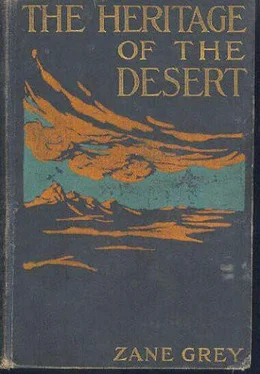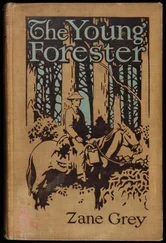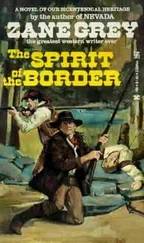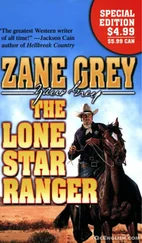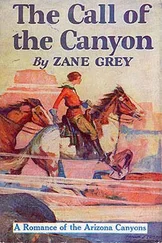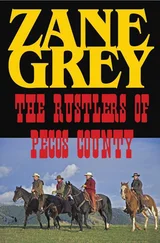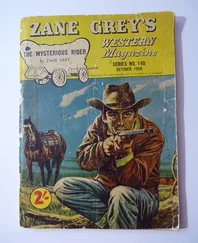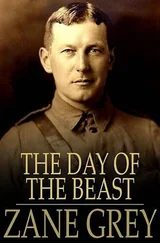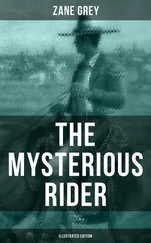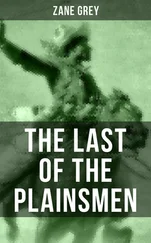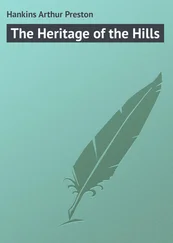Hare's slumbers that night were broken. He dreamed of a great gray horse leaping in the sky from cloud to cloud with the lightning and the thunder under his hoofs, the storm-winds sweeping from his silver mane. He dreamed of Mescal's brooding eyes. They were dark gateways of the desert open only to him, and he entered to chase the alluring stars deep into the purple distance. He dreamed of himself waiting in serene confidence for some unknown thing to pass. He awakened late in the morning and found the house hushed. The day wore on in a repose unstirred by breeze and sound, in accord with the mourning of August Naab. At noon a solemn procession wended its slow course to the shadow of the red cliff, and as solemnly returned.
Then a long-drawn piercing Indian whoop broke the midday hush. It heralded the approach of the Navajos. In single-file they rode up the lane, and when the falcon-eyed Eschtah dismounted before his white friend, the line of his warriors still turned the corner of the red wall. Next to the chieftain rode Scarbreast, the grim war-lord of the Navajos. His followers trailed into the grove. Their sinewy bronze bodies, almost naked, glistened wet from the river. Full a hundred strong were they, a silent, lean-limbed desert troop.
"The White Prophet's fires burned bright," said the chieftain. "Eschtah is here."
"The Navajo is a friend," replied Naab. "The white man needs counsel and help. He has fallen upon evil days."
"Eschtah sees war in the eyes of his friend."
"War, chief, war! Let the Navajo and his warriors rest and eat. Then we shall speak."
A single command from the Navajo broke the waiting files of warriors. Mustangs were turned into the fields, packs were unstrapped from the burros, blankets spread under the cottonwoods. When the afternoon waned and the shade from the western wall crept into the oasis, August Naab came from his cabin clad in buckskins, with a large blue Colt swinging handle outward from his left hip. He ordered his sons to replenish the fire which had been built in the circle, and when the fierce-eyed Indians gathered round the blaze he called to his women to bring meat and drink.
Hare's unnatural calmness had prevailed until he saw Naab stride out to front the waiting Indians. Then a ripple of cold passed over him. He leaned against a tree in the shadow and watched the gray-faced giant stalking to and fro before his Indian friends. A long while he strode in the circle of light to pause at length before the chieftains and to break the impressive silence with his deep voice.
"Eschtah sees before him a friend stung to his heart. Men of his own color have long injured him, yet have lived. The Mormon loved his fellows and forgave. Five sons he laid in their graves, yet his heart was not hardened. His first-born went the trail of the fire-water and is an outcast from his people. Many enemies has he and one is a chief. He has killed the white man's friends, stolen his cattle, and his water.
To-day the white man laid another son in his grave. What thinks the chief? Would he not crush the scorpion that stung him?"
The old Navajo answered in speech which, when translated, vitas as stately as the Mormon's.
"Eschtah respects his friend, but he has not thought him wise. The White Prophet sees visions of things to come, but his blood is cold. He asks too much of the white man's God. He is a chief; he has an eye like the lightning, an arm strong as the pine, yet he has not struck. Eschtah grieves. He does not wish to shed blood for pleasure. But Eschtah's friend has let too many selfish men cross his range and drink at his springs. Only a few can live on the desert. Let him who has found the springs and the trails keep them for his own. Let him who came too late go away to find for himself, to prove himself a warrior, or let his bones whiten in the sand. The Navajo counsels his white friend to kill."
"The great Eschtah speaks wise words," said Naab. "The White Prophet is richer for them. He will lay aside the prayers to his unseeing God, and will seek his foe."
"It is well."
"The white man's foe is strong," went on the Mormon; "he has many men, they will fight. If Eschtah sends his braves with his friend there will be war. Many braves will fall. The White Prophet wishes to save them if he can. He will go forth alone to kill his foe. If the sun sets four times and the white man is not here, then Eschtah will send his great war-chief and his warriors. They will kill whom they find at the white man's springs. And thereafter half of all the white man's cattle that were stolen shall be Eschtah's, so that he watch over the water and range."
"Eschtah greets a chief," answered the Indian. "The White Prophet knows he will kill his enemy, but he is not sure he will return. He is not sure that the little braves of his foe will fly like the winds, yet he hopes. So he holds the Navajo back to the last. Eschtah will watch the sun set four times. If his white friend returns he will rejoice. If he does not return the Navajo will send his warriors on the trail."
August Naab walked swiftly from the circle of light into the darkness; his heavy steps sounded on the porch, and in the hallway. His three sons went toward their cabins with bowed heads and silent tongues. Eschtah folded his blanket about him and stalked off into the gloom of the grove, followed by his warriors.
Hare remained in the shadow of the cottonwood where he had stood unnoticed. He had not moved a muscle since he had heard August Naab's declaration. That one word of Naab's intention, "Alone!" had arrested him. For it had struck into his heart and mind. It had paralyzed him with the revelation it brought; for Hare now knew as he had never known anything before, that he would forestall August Naab, avenge the death of Dave, and kill the rustler Holderness. Through blinding shock he passed slowly into cold acceptance of his heritage from the desert.
The two long years of his desert training were as an open page to Hare's unveiled eyes. The life he owed to August Naab, the strength built up by the old man's knowledge of the healing power of plateau and range–these lay in a long curve between the day Naab had lifted him out of the White Sage trail and this day of the Mormon's extremity. A long curve with Holderness's insulting blow at the beginning, his murder of a beloved friend at the end! For Hare remembered the blow, and never would he forget Dave's last words. Yet unforgetable as these were, it was duty rather than revenge that called him. This was August Naab's hour of need. Hare knew himself to be the tool of inscrutable fate; he was the one to fight the old desert-scarred Mormon's battle. Hare recalled how humbly he had expressed his gratitude to Naab, and the apparent impossibility of ever repaying him, and then Naab's reply: "Lad, you can never tell how one man may repay another." Hare could pay his own debt and that of the many wanderers who had drifted across the sands to find a home with the Mormon. These men stirred in their graves, and from out the shadow of the cliff whispered the voice of Mescal's nameless father: "Is there no one to rise up for this old hero of the desert?"
Softly Hare slipped into his room. Putting on coat and belt and catching up his rifle he stole out again stealthily, like an Indian. In the darkness of the wagon-shed he felt for his saddle, and finding it, he groped with eager hands for the grain-box; raising the lid he filled a measure with grain, and emptied it into his saddle-bag. Then lifting the saddle he carried it out of the yard, through the gate and across the lane to the corrals. The wilder mustangs in the far corral began to kick and snort, and those in the corral where Black Bolly was kept trooped noisily to the bars. Bolly whinnied and thrust her black muzzle over the fence. Hare placed a caressing hand on her while he waited listening and watching. It was not unusual for the mustangs to get restless at any time, and Hare was confident that this would pass without investigation.
Читать дальше
